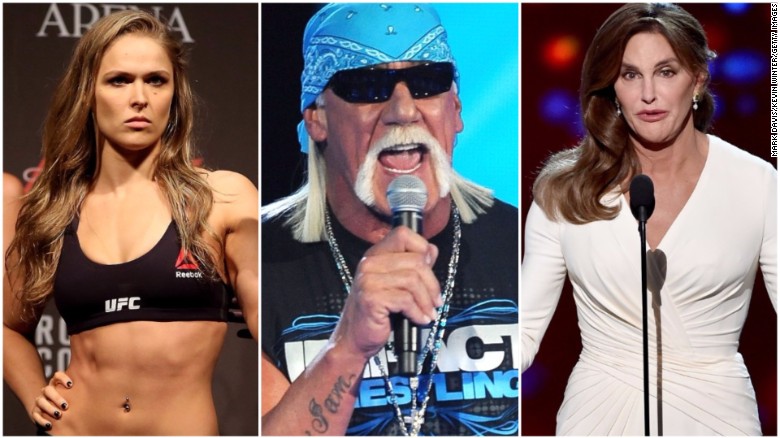U.S. Elections: Ronda Rousey, Caitlyn Jenner among those backing hopefuls

When the collective brain trust of Mike Tyson, John Rocker and Dennis Rodman all agree on one thing, it's bound to be controversial.
No strangers to tabloid drama, the outspoken retired athletes all endorse Republican frontrunner Donald Trump, joining a chorus of sports personalities who are weighing in on the U.S. presidential election.
The backing of popular sports figures — depending on their background — can add a level of cache to a budding presidential nominee, senior political strategist Jeremy Bird tells.
"They do give validation to candidates, especially candidates who need validation," says Bird, who worked on both of Barack Obama's campaigns, serving as national field director in 2012. Bird went on to establish the consultancy 270 Strategies which counts Hillary Clinton as one of its clients.
"For candidates that are less well known, having the endorsement of somebody famous, somebody (trustworthy) — that can have an impact on shaping a voter's overall view of a candidate, especially if that's coupled with two or three other people that are figures that (command) respect generally."
One such candidate in the run-up to the 2008 campaign happened to be Obama, who was buoyed by a number of endorsements from celebrity athletes, particularly from the world of the NBA, where LeBron James, Magic Johnson and Michael Jordan — who famously stayed out of politics throughout his career — all threw their support behind the upstart senator from Illinois.
The current White House resident turned out to be a natural at courting votes from athletes. "He might be one of the only presidents who wasn't tuned into CNN or MSNBC on the campaign bus — he was tuned into ESPN," Bird recalls. "So it was unique in a sense that he really loves sports, and it was nice for him to have those athletes support him who he had watched play and cheer on the court."
James, in particular, was a key get, according to Bird, because of his status as the most popular athlete in Ohio, a crucial swing state.
"We spent a lot of time courting him and his people because we felt like he was such a star, especially in the Cleveland area, that having him (endorse Obama) was not necessarily going to be the difference between somebody supporting us and not supporting us — but it was going to have a difference in their enthusiasm.
"How one uses it does matter too," explains Bird. "Saying LeBron is an endorsement in a press release is not going to have much impact. But doing an event at a big basketball arena with LeBron and Jay Z where people could sign up and register — now that could have a big impact."
"There are cases of individual endorsements where either that figure is so important in that state, or so important to that demographic, it can have a bigger impact; but I think that's probably few or far between," he adds.
A polarizing figure by nature, Trump has by far the most public declarations of support from within the sports world to date — though many have come from athletes who themselves have been cast as social pariahs once. They include the likes of Tyson, Rodman, golfer John Daly, ex-NFL star Terrell Owens and college hoops coach Bob Knight.
"When you look at everybody endorsing a certain candidate, it says a lot about that candidate," says Bird.
Former Atlanta Braves closer Rocker made headlines in 1999 for a derisive interview with Sports Illustrated where he knocked homosexuals and minorities. "The biggest thing I don't like about New York are the foreigners. I'm not a very big fan of foreigners," he said.
"I wish someone … would have the backbone to make unpopular comments," Rocker told The Daily Caller in January. "Trump is that guy."
Endorsements from figures like Rocker can actually be detrimental to a campaign if they are not isolated, Bird says.
"You can embrace that support or you can say that you don't agree with that person's view on certain things, even if they do support you," he says. "I think they can hurt, especially when you get a bunch of people supporting you who are divisive characters in the public eye who have said things that have turned off a lot of voters."
It could be argued, however, that Trump's own divisiveness is what attracts him to certain voter groups and celebrity endorsements.
"These types of personalities are all heroes to non-college, blue collar males," Larry Sabato, professor of politics at the University of Virginia told CNN, mentioning the likes of Rodman and Tyson. "Who supports Trump disproportionately? Non-college, blue collar males. So they only serve to reinforce Trump's fundamental appeal to his constituency."
"The biggest thing that these endorsements do for a candidate is help build name recognition," Sabato adds. "But if there's one thing Donald Trump doesn't need is more name recognition. So in a sense they are irrelevant."
Pro wrestler Hulk Hogan — who half-jokingly volunteered to run alongside Trump early in his campaign — recently won a $115 million lawsuit against Gawker for posting a sex tape of him with a friend's wife. However, he was axed by the WWE in 2015 for making a racist slur about his daughter's boyfriend.
Политика конфиденциальности | Правила пользования сайтом








